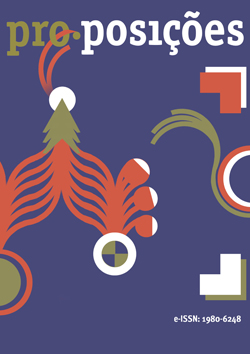Resumen
This study mainly aimed to investigate how the relationships established at school affect the constitution of the self of autistic subjects. We carried out a multiple case study with children aged from seven to 14 years old enrolled in a public school that featured diverse profiles, with a total of 11 participants, such as teachers, coordinator, special education assistant (all of them women), as well as five autistic children (three boys and two girls) and two non-autistic girls. During the 6-month period, we conducted interviews with the adults, natural observations of school situations, and collaborative dynamics with the participating children. In light of theories from a dialogical-cultural perspective, it was possible to analyze our findings based on an I-positions framework, self positions, for each participant subject. From the convergence of each of the possible positions of all the subjects, we arrived at three axes of relationship: Playing, Helping, and Caring.
Citas
Bardin, L (1977). Análise de Conteúdo Martins Fontes.
Bandlamudi, L. (1994). Dialogics of understanding self/culture. Ethos, 22(4), 460-493.
Bibace, R., & Kharlamov, N. A. (2013). The spiral: The concept of development after Werner and Kaplan. Culture and Psychology, 19(4), 453-462. https://doi.org/10.1177/1354067X13500324
Boulanger, D. (2017). Extending social representation theory through dialogical self theory: Subjects’ and alters’ relating with space. International Journal for Dialogical Science, 10(2), 9-33.
Branco, A. U., Branco, A. L., & Madureira, A. F. (2008). Self-development and the emergence of new I-positions: Emotions and self-dynamics. Studia Psychologica, (8), 23-39.
Branco, A. U. (2016). Values and their ways of guiding the psyche. In: J. Valsiner, G. Marsico, N. Chaudhary, T. Sato & V. Dazzani (Eds.), Psychology as the science of human being: The Yokohama Manifesto (pp. 225-244). Springer. https://doi.org/10.1007/978-3-319-21094-0_13
Bruner, J. (2008). Actos de significado Edições 70.
Flusser, V. (2007). O mundo codificado Cosac Naify.
Freire, S. F. de C. D. (2018). Intersubjectivity in action: Negotiations of self, other, and knowledge in students’ talk. In A. U. Branco (Ed.), Alterity, values and socialization: Human development within educational contexts (pp. 149-167). Springer.
Freire, S. F. de C. D., & Branco, A. U. (2016). A teoria do self dialógico em perspectiva. Psicologia: Teoria e Pesquisa, 32(1), 25-33. https://doi.org/10.1590/0102-37722016012426025033
Hermans, H. J. M. (2001a). The construction of a personal position repertoire: method and practice. Culture & Psychology, 7(3), 323-366. https://doi.org/10.1177/1354067X0173005
Hermans, H. J. M. (2001b). The dialogical self?: Toward a theory. Culture & Psychology, 7(3), 243-281. https://doi.org/10.1177/1354067X0173001
Hjörne, E., van der Aalsvoort, G., & Abreu, G. de (Eds.). (2012). Learning, social interaction and diversity: Exploring school practices Springer. http://dx.doi.org/10.1007/978-94-6091-803-2
Iannaccone, A., Marsico, G., & Tateo, L. (2012). Educational self: A fruitful idea? In M. B. Ligorio & M. Cesar (Eds.), The interplays between dialogical learning and dialogical self (pp. 219-252). Information Age.
Iacono, J. P., & Mori, N. N. R. (2004). Deficiência mental e terminalidade específica: Novas possibilidades de inclusão ou exclusão velada? Anais Anped Sul, 5, 1-16. Disponível em: https://www5.unioeste.br/portalunioeste/arquivos/proex/pee/nov_pos_de_incl_ou_excl_vel.pdf
Linell, P. (2009). Rethinking language, mind, and world dialogically: Interactional and contextual theories of human sense-making Information Age.
Luengo, F. C. (2010). A vigilância punitiva: A postura dos educadores no processo de patologização e medicalização da infância Editora Unesp. https://doi.org/10.7476/9788579830877
Marková, I. (2003). Constitution of the Self: Intersubjectivity and dialogicality. Culture and Psychology, 9(3), 249-260. https://doi.org/10.1177/1354067X030093006
McAdams, D. P. (2001). The psychology of life stories. Review of General Psychology, 5(2), 100-122. https://doi.org/10.1037/1089-2680.5.2.100
McPartland, J. C., Klin, A., & Volkmar, F. R. (2014). Asperger’s syndrome: Acessing and treating high-functioning autism spectrum disorder (2nd ed.). Guilford.
Ministério da Educação. (2014). Planejando a próxima década. Disponível em: http://pne.mec.gov.br/images/pdf/pne_conhecendo_20_metas.pdf
Mello, A. M. S. R. de, Andrade, M. A., Ho, H., & Dias, I. de S. (2013). Retratos do autismo no Brasil Associação de Amigos do Autista.
Organização das Nações Unidas. (1994). Declaração de Salamanca: Sobre princípios, políticas e práticas na área das necessidades educativas especiais. Disponível em: http://portal.mec.gov.br/seesp/arquivos/pdf/salamanca.pdf
Rios, C., Ortega, F., Zorzanelli, R., & Nascimento, L. F. (2015). Da invisibilidade à epidemia: A construção narrativa do autismo na mídia impressa brasileira. Interface: Communication, Health, Education, 19(53), 325-335. https://doi.org/10.1590/1807-57622014.0146
Rodina, K. A. (2006). Vygotsky’s social constructionist view on disability: A methodology for inclusive education a short summary keywords [Paper presentation]. 11th Annual Conference of the European Learning Styles Information Nettwork (ELSIN), Oslo, Norway. Available in: http://lchc.ucsd.edu/MCA/Paper/VygotskyDisabilityEJSNE2007.pdf
Salgado, J., & Hermans, H. J. M. (2005). The return of subjectivity: From a multiplicity of selves to the dialogical self. E-Journal of Applied Psychology, 1(1), 3-13. Available in: https://bit.ly/3C9DGuk
Skliar, C. (2001). Seis perguntas sobre a questão da inclusão ou de como acabar de uma vez por todas com as velhas – e novas – fronteiras em educação. Pro-Posições, 12(2-3), 11-21.
Skliar, C. (2003). A educação e a pergunta pelos outros: Diferença, alteridade, diversidade e os outros “outros”. Ponto de Vista, (5), 37-49. Disponível em: https://periodicos.ufsc.br/index.php/pontodevista/article/view/1244/4251
Valsiner, J., & Han, G. (2008). Where is culture within the dialogical perspectives on the self? International Journal for Dialogical Science, 3(1), 1-8.
Valsiner, J., Marsico, G, Chaudhary, N., Sato, T., & Dazzani, V. (Eds.). (2018). Psychology as the science of human being: The Yokohama Manifesto Springer.
van der Veer, R., & Valsiner, J. (2014). Vygotsky: Uma síntese Loyola.
Vigotski, L. S. (2003). Psicologia pedagógica Artmed.
Vygotski, L. S. (1997). Obras escogidas (Vol. 5). Visor.
Vygotski, L. S. (2006). Obras escogidas (2nd ed., Vol. 4). A. Machado Libros.

Esta obra está bajo una licencia internacional Creative Commons Atribución 4.0.
Derechos de autor 2021 Raquel Pacheco, Sandra Ferraz de Castillo Dourado Freire


